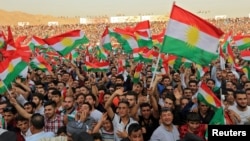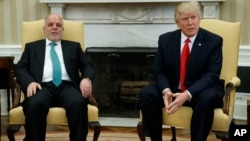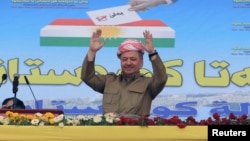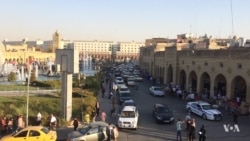Iraqi Prime Minister Haider al-Abadi has said he is prepared to intervene militarily if a referendum held by the nation’s Kurdish population results in violence.
Speaking to the Associated Press Saturday, Abadi said the Kurdish vote on independence is “a dangerous escalation” that will invite violations of Iraqi sovereignty.
Abadi also told an Iraqi news agency that the Kurds would be “playing with fire” by continuing with plans for the referendum, which is scheduled for September 25 in the three governorates that make up the Kurdish autonomous region. The vote is also expected to be held in areas controlled by Kurds but claimed by the Baghdad government.
Turkey warns of ‘grave mistake’
On Friday, Turkish Prime Minister Binali Yildirim warned that the Iraqi Kurdish plan to hold an independence referendum was a “grave mistake.”
Iraqi Kurdistan regional President Masoud Barzani is backing the referendum.
Turkey, which borders the Iraqi Kurdish region, has strong ties with Barzani, but Ankara has been stepping up its pressure to call off the vote.
“There are 10 days left. Therefore, I want to repeat our friendly call to Masoud Barzani: Correct this mistake while there is still time,” Yildirim said Friday to supporters.
The warning was followed by Ankara’s first direct threat.
“We don’t want to impose sanctions, but, if we arrive at that point, there are steps that have been already planned that Turkey can take,” Yildirim added.
The warning came days after the Turkish foreign minister, Mevlut Cavusoglu, told the Kurds that they would “pay a price for the vote.”
Ankara fears secession
Ankara, with its own restive Kurdish minority, in an area that mainly borders Iraqi Kurdistan, fears an independent Kurdish state could fuel similar secessionist demands. Those fears are heightened by the suspicion that Syrian Kurds on the Turkish border harbor the same independence ambitions.
Turkish fears of the referendum have created rare common ground across the country’s deep political divide.
“Balkanization of the Middle East would bring instability,” warned Ceyda Karan, a columnist with the Turkish opposition Cumhuriyet newspaper. “Borders are not drawn fairly in many parts of the world. The question of where to find fairness in redrawing them is unknown.”
WATCH: Iraqi Kurds Prepare for Independence Vote, Despite Opposition
US: keep focus on IS
The United States has voiced strong opposition to the independence vote.
On Friday the White House released a statement saying the United States “does not support” the Kurdish plan to hold a referendum, and that the plan “is distracting from efforts to defeat ISIS and stabilize the liberated areas.” Further, it says, “holding the referendum in disputed areas is particularly provocative and destabilizing.”
The Trump administration is calling on the Kurds to cancel the referendum and instead engage in “serious and sustained dialogue with Baghdad,” which the U.S. has offered to facilitate.
Iran has also registered its opposition to the referendum, but Turkey arguably has the most leverage on the Iraqi Kurds. The Habur border gate on Turkey’s frontier with Iraq is the main trade route to the outside world for Iraqi Kurdistan, while an oil pipeline to the Turkish Mediterranean port of Ceyhan provides a financial lifeline.
Sanctions possible
Sanctions could prove to be a double-edged sword.
“Habur does not only mean gate to Iraqi Kurdistan,” points out former senior Turkish diplomat Aydin Selcen, who set up Turkey’s consulate in Iraqi Kurdistan’s capital of Irbil.
“Habur means gate to Iraq and in today’s terms means gate to the Middle East as all border gates are closed with Syria. There is the oil pipeline; Iraqi Kurdistan oil, including Kirkuk oil, is being marketed to global markets through Ceyhan. That is a win, win for Ankara,” Selcen added.
Financial considerations are not the only factors that Ankara has to consider.
“Ankara is against [the referendum], but on the other hand, Barzani is the best ally in the region. I think they are not that vocal when it comes to the referendum,” said political scientist Cengiz Aktar.
Barzani in the past decade has developed a close relationship with Ankara, one built not only on lucrative trade but also on security cooperation.
Barzani has provided assistance to Ankara in Turkey’s war against the Kurdish rebel group PKK, which is waging a decades-long insurgency for greater minority rights in Turkey and has bases in Iraqi Kurdistan.
Turkish election politics could further restrict Ankara’s room to maneuver.
The Iraqi Kurdish independence referendum threatens to complicate Turkish President Recep Tayyip Erdogan’s re-election bid in 2019.
“I understand Mr. Erdogan is trying to balance the traditional Kurdish vote that goes with [Erdogan’s] AK Party and [Turkish] nationalists,” said former diplomat Selcen, who is now a regional analyst.
The Kurdish vote in Turkey traditionally accounts for about 10 percent of Erdogan’s support, votes that could be crucial in what is predicted to be a closely fought presidential election.
Selcen suggests the solution to the political conundrum posed by the Iraqi Kurdish independence vote to Erdogan’s own ambitions could be to simply do nothing.
“I think in today’s system in Turkey, one should only follow closely what Mr. Erdogan says, and, knowing his usual style and usual rhetoric, I find Mr. Erdogan’s position much milder and more moderate. I will speculate that following September 25, the day of the referendum, it will be business as usual between Ankara and Irbil.”
Dorian Jones contributed to this report from Istanbul.









